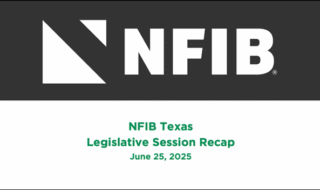February 17, 2025
Special Feb. 25 conference call on small business resources available. Register now.
Happy Presidents’ Day. Welcome to the February 17-21 edition of the NFIB California Main Street Minute from your small-business advocacy team in Sacramento.
Save the Date: February 25
Please circle Tuesday, February 25, on your calendar to join NFIB, LA BizFed, and a representative from the governor’s office of small business advocacy, for a conference call on resources available to small business owners, especially those affected by the wildfires. Tim Taylor, NFIB CA’s Policy Director, will also provide a brief update on legislation, regulations and other state issues impacting small business owners this year. The call will run from 10 a.m. to 11 a.m. More information and the link to register available here. In case you can’t make it, the call will be recorded and posted on the NFIB website.
The recording also will be added to our Rebuilding Resources for Victims of the Southern California Wildfires story currently on the NFIB webpage and constantly updated.
The Legislature
Last Monday (February 10), NFIB joined 46 other business groups in sending a letter to the Senate chairman of its Committee on Budget and Fiscal Review and the Assembly chairman of its Committee on Budget. The message was a simple one: the state should live up to its promise to get its house in order regarding the condition of its Unemployment Insurance Trust Fund.
“For context, employers pay $42 per employee per year when our UI Fund is solvent in federal unemployment insurance taxes (‘FUTA taxes’),” said the letter. “With ongoing insolvency, FUTA taxes are increased by $21 per year per employee, up to a maximum of $434 per year. Because of these increases, California employers paid an estimated $770 million in additional federal taxes in 2024 (for a total of $4.9 billion in UI contributions) and are estimated to pay an additional $1.2 billion in 2025 (for a total of $5 billion). Notably, these amounts do not account for the cost of rebuilding and the added UI-fund drain that the wildfires will cause as workers tap this critical stopgap and employers begin to pay for those claims via the UI Fund.
“As it stands now, California’s UI Fund debt is at historic levels—with total debt over $20 billion. This debt has only grown since the COVID-19 pandemic and is expected to grow until federal tax increases finally rise high enough to push it back down. Functionally, this means California employers are facing a decade or more of tax increases, with total payments likely to far surpass the UI-related tax increases following the Great Recession.”
The letter, jointly endorsed by the California Chamber of Commerce, the California Farm Bureau, and the California Restaurant Association, to name a few of the other business groups, concludes, “In the 2023-2024 Budget, the promised UI Fund assistance—both the direct payment and the tax rebates—did not materialize. As California’s 2022-2023 budget surplus disappeared, California employers became victims of the state’s difficult budget situation. While we understand and acknowledge that California faced budget shortfalls in 2023-2024 and 2024-2025, we believe that the Proposed Budget has a brighter outlook and is the appropriate time to deliver on these commitments.”
Speaking of Letters
Two days later, NFIB and 142 other groups sent a another jointly signed letter to the chairmen, Sen. Scott Wiener and Assemblymember Jesse Gabriel, supporting passage of Senate Bill 72, which “would modernize the California Water Plan statute and its provisions by establishing long-term water supply targets for the state to achieve and would update the requirement that state agencies develop a plan to achieve those targets in consultation with local water agencies, wastewater service providers, irrigation districts, and others.”
Wage Theft
Seems like only yesterday ( July 1, 2024, in fact) when Gov. Gavin Newsom signed into law some badly needed and long-lobbied-for reforms to the Private Attorneys General Act (PAGA), curbing the rampant lawsuit abuse it unleashed since its 2004 creation.
But not all the choppy legal waters have been calmed. Two bills recently introduced in the Legislature would roil the seas again. “One measure, Senate Bill 310 by San Francisco Democratic Sen. Scott Wiener, would allow workers to recoup more money through private lawsuits instead of filing claims through a heavily delayed system at the Labor Commissioner’s Office,” reports CalMatters.
“Another bill, by Fremont Democratic Sen. Aisha Wahab, aims to push employers to pay up faster after workers have won their claims. SB 261 would require the Labor Commissioner’s Office to publicly post all its decisions against employers who have not yet paid claims. It would also allow the office to seek more fines against employers who do not pay within six months.”
NFIB is monitoring their progress and working with business coalition partners on the best approach to holding innocent small-business owners as harmless as possible. Stay tuned.
Murmurs, Rumblings, Gossip, Forewarnings
You never know for certain where rumors originate, from legitimate sources or the K Street wino across from the Capitol, but there has been talk of taking another run at instituting a sales tax on services.
In the past 10 years, NFIB members have been emphatic in their opposition to the idea, voting 98% against it on their 2019 state ballot, 97% against it on their 2017 ballot, and 96% against it on their 2016 ballot.
In an interview with State Director John Kabateck for an NFIB California Podcast, Anthony Pugliese, president and chief executive officer of the California Society of CPAs, discussed some of the unintended consequences of extending the sales tax to services, such as its punishing tax-pyramiding effect, and the supreme difficulty of determining and recording when, where, and how a service was delivered. Far from helping stabilize California’s tax collection volatility, said Pugliese, it would actually exacerbate it.
NFIB is armed with the arguments against a sales tax on services, which helped derail past attempts, even when they had the strong backing of former Assembly Speaker Rob Hertzberg.
Speaking of NFIB-member Ballots
Tomorrow (February 18), NFIB will release the results of its 2025 state member ballot.
Reminder: Special Elections Underway
Two special elections to fill vacancies in the California State Legislature are underway. The Primary Election in both contests is Tuesday, February 25, and voting has already started. The General Election will be April 29.
Assembly District 32, which includes parts of Kern and Tulare counties, is the seat formerly held by Vince Fong, who was elected to Congress.
Senate District 36, which includes mainly Orange County and a small part of Los Angeles County, is the seat formerly held by Janet Nguyen, who was elected to the Orange County Board of Supervisors.
FYI
The Public Policy Institute of California (PPIC) has been busy of late cranking out the research. “Nineteen million Californians work either for wages or salaries (89%) or are self-employed (11%). Only 15% work from home, but employment is growing faster in jobs where remote work is more common,” is the topline from its Who Are California’s Workers? report.
In its California’s Businesses survey, PPIC found, “In 2023, California had over 1.7 million private-sector businesses, accounting for 86% (15.5 million) of the state’s jobs and generating 90% of the state’s GDP. The public sector comprised 36,700 employers and accounted for the remaining 14% of jobs (2.5 million).”
And on its 2025 Fact Sheet, Self-Employment in California, In 2023, close to 2.2 million Californians (11.5% of the workforce) reported that they were primarily self-employed. California’s self-employment rate is higher than the US rate (9.9%) and ranks 9th across states. About 10% of Californians combine self-employment with wage and salary work (as of 2016).
National
NFIB hosted its first Small Business Deduction Summit of 2025 last week on Capitol Hill. Members traveled to the nation’s capital to share why Congress must make the 20% Small Business Deduction permanent to avoid a massive tax hike on 33 million small businesses nationwide. More here.
On NFIB’s other top goal, Vice President of Federal Government Relations Jeff Brabant spoke to KABC’s Frank Mottek about the need to free small business owners from the Beneficial Ownership reporting requirements in the Corporate Transparency Act.“This only affects businesses with 20 or fewer employees and less than $5 million in revenue … So, if you want to open up a small business, you now have to prove with the national intelligence agency, the Financial Crimes Enforcement Network (FinCEN), and register with them, the driver’s license information, the business address of not only the owners of your business, but also anyone with substantial control of the business.”
Next Main Street Minute, February 24. All Main Streets Minutes can be found on the NFIB website here. Pull down the California tab in the upper-right-hand corner.
NFIB is a member-driven organization advocating on behalf of small and independent businesses nationwide.
Related Articles














